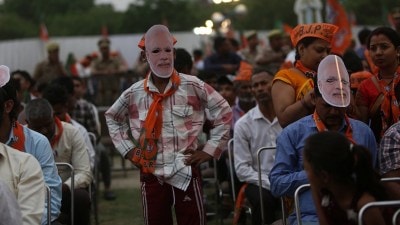- India
- International
Prison terms
Even when they were imprisoned, the Nehrus remained at the centre of history
 The book cover.
The book cover.
Book: When Stone Walls Cry: The Nehrus in Prison
Author: Mushirul Hasan
Publisher: Oxford University Press
Pages: 201
Price: 695
In 1949, on the 60th birthday of Jawaharlal Nehru, a book carrying articles about him from top national and international leaders was published to commemorate the occasion. Among the contributors was the Singapore leader Lee Kuan Yew, who said that while Nehru is lionised by everyone as a revolutionary, few give him credit for being an equally able administrator of a newly independent country. Nearly seven decades later, it is the opposite — Nehru is seen from the prism of his 17 year-long prime ministerial stint and little is remembered of his role as a freedom fighter.
Mushirul Hasan sets out to correct that narrative by highlighting the pre-1947 trajectory of not only Jawaharlal Nehru, but also of his family, including his father, Motilal Nehru, all of whom spent many years in prison. Jawaharlal alone spent almost nine years in colonial jails, with the longest spell of 1,040 days following the Quit India movement. It is during that period in Ahmadnagar Fort prison, from April to September 1944, that he wrote his The Discovery of India.
Anyone who has read Discovery… cannot but come out impressed with Nehru’s intellectual passion, breadth of learning and fluidity of expression, even though it is an amateur historian’s work, based largely on memory and inputs from his fellow prisoners. It is a hymn to the glories of India, without being blind to its faults. As Nehru later recalled, it was his attempt “to construct India as an object that he and his compatriots can relate to in some fundamental way”.
His idea of India was encapsulated in the memorable paragraph on Page 47: “She was like some ancient palimpsest on which layer upon layer of thought and reverie had been inscribed, and, yet, no succeeding layer had completely hidden or erased what had been written previously. All of these had existed in our conscious or subconscious selves, though we may not have been aware of them. And they have gone to build up the complex mysterious personality of India.”

But Nehru penned other books as well during his prison terms. He wrote his An Autobiography entirely in prison between June 1931 and February 1935. It was the most self-revelatory thing that he had produced and it went into many editions in England, earning Krishna Menon, his editor, a handsome amount in London. Glimpses of World History showcased Nehru’s intellectual prowess to the world. Maina wa Kinyatti of Kenya wanted the book to be sent — in fact — smuggled into the Kamiti prison.
Besides books, Nehru wrote many letters from prisons — to his party colleagues, family members, friends and even unknown countrymen who wrote to him. Later, Nehru reflected that “What I wrote may or may not be of value. But the writing of it was of tremendous value to me. You have to read and study and think.” Instead of brooding over the lost years, Nehru channelised his anger into writing. Forced into loneliness, he turned to himself for fellowship and guidance and arranged his thoughts into words with grace and spontaneity.
Hasan, a historian of repute, is a self-confessed Nehruvian and acknowledges that “there is sufficient cause to shield Jawaharlal Nehru’s memory from the calumny of his detractors”. A more tightly edited book would have helped the cause more.
Notwithstanding that blemish, Hasan adds value by exploring a wide range of historical events surrounding the prison sentences. He looks at Nehru’s early years after his return from England and his constant tension with his father, Motilal, who was at that point, a moderate among moderates. The evolution of his father into a nationalist freedom fighter under Gandhi’s influence, giving up his lucrative practice, and his son’s persuasion, form a fascinating backdrop to the changes witnessed in Allahabad.
Motilal, who presented the Anand Bhawan to the nation on 27 March, 1930, was instrumental in ensuring that the family’s connection with the nation became rooted and emotional. By then, it was clear to the Nehrus that serving prison time was much more than a marker of participation in the independence movement. Nayantara Sehgal believed what she and her sisters were told when they were growing up: that “history was ourselves and we were making it”.
In that sense, the Nehrus were different from many other global freedom fighters. “I went for a long holiday for 27 years,” Nelson Mandela once said of his years in prison. The Nehrus would disagree with him.
Apr 25: Latest News
- 01
- 02
- 03
- 04
- 05




































